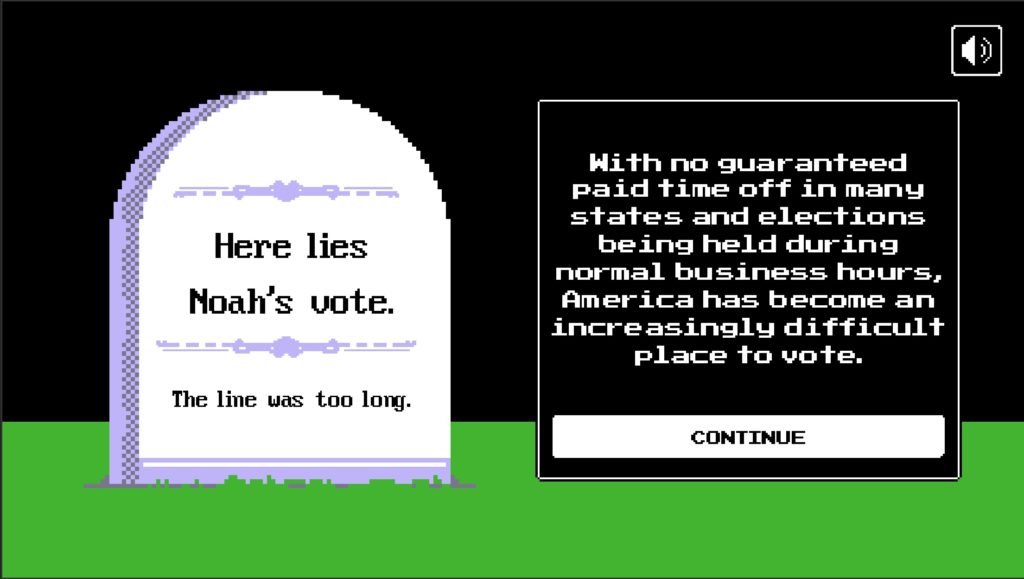Share this story:
The New York Times released a video game on its Op-Ed page this week. The topic: voter supression. The folks who made it for The Times were Chris Baker, Brian Moore and Mike Lacher, better known as Everyday Arcade, whose “The GOP Arcade” features a wealth of satrical takes on the election.
Youth Radio talked to Brian Moore back in September in an article at our sister site Turnstyle. Here’s an edited version of that article.
Not even video games are safe from the touch of the campaign. There are scores of products in the iOS App Store looking to make either a quick buck or a “real difference” by marrying gameplay with this election’s troupes. There’s plenty of options for playing Flappy Bird or Whack-a-Mole clones with Hillary Clinton or Donald Trump skins, if you’re so inclined.
What you won’t find in the App Store are some of the sharpest satirical takes in game form. That’s because The GOP Arcade, home to interactive hot takes like Trump Toss and the topical Epipen Tycoon was rejected by the App Store.
“We were supposed to release it as an app,” said Brian Moore, one of the small group of friends behind The GOP Arcade. “Apple rejected us because of the content of these games.”
That led the crew, which works under the handle Everyday Arcade, to start putting the individual games up on the web. The games themselves are simple affairs that rely on familiar mechanics (e.g. Angry Olds is a riff on Angry Birds that comments on the influence that older voters have on political policy) to make their point. It can take just a few minutes to play through a game on The GOP Arcade and get to it’s biting center.
I first took notice of their work in the form of Thoughts and Prayers, which popped up in the wake of the Orlando Pulse nightclub tragedy. In this piece players are encouraged to tap away at their phones, sending the titular thoughts and prayers to attempt to stop a wave of mass shootings. Part-way through the game a third option—banning assault weapons—appears. That button never ends up working. Nor are any lives saved. It’s just about the nihilistic satire possible, and yet somehow reassuring in the physicalization of the frustration: an acknowledgment that no amount of tapping on a smartphone is going to change the world.
“Satire wasn’t necessarily the focus in the beginning,” Moore told me. The original idea was to develop a form of “playable news”—small games that used current events as the fodder for themes. It probably comes as no shock that two of the Everyday Arcade crew used to work at Buzzfeed once upon a time.
The core idea of making topical video games out of simple mechanics isn’t new. Sites like Newgrounds were once the home of countless Flash games which included takes on the news of the day. What’s changed since the early days of browser games that relied on Flash is the rise of HTML 5 and tools like Construct 2—which powers The GOP Arcade—and allows for these experiences to be played pretty much anywhere they pop-up: from an iPhone to inside Facebook.
An established tool-base also enables the fast turnaround on some of the projects. For Epipen Tycoon the Everyday Arcade team “had the idea on (a) Tuesday and we had it go out by Friday,” said Moore. The team, who all have day jobs, keep a Slack channel open where they share ideas. The work comes together as designers an developers work simultaneously. For Epipen Tycoon the total work hours added up to under 60 for the whole team.
While the games have gotten the attention of blogs like Kotaku the team isn’t exactly rolling in cash because of the work.
“There is no business model,” said Moore. “We rarely, if ever, get close to making money on this.”
Moore and his colleagues, whose day jobs involve doing interactive work for digital agencies and other marketers, view work like Everyday Arcade as “passion projects to keep us sane because some of our work doesn’t see the light of day.”
While there might not be any money in satirical web browser based gaming there is something culturally significant about the generations raised on video games expressing their political frustrations in their preferred medium. Maybe it’s just the tedious nature of an endless stream of verbal commentary in the form of essays and social media hot takes, but these games feel refreshing and thoughtful in a way that much of the rest of the cultural storm does not. Perhaps it’s the interactive nature of gaming, which holds as much of a mirror up to the player’s psyche as it does to the world around it, that creates an appearance of thoughtfulness.
Or it could just be that so much of the current cultural climate involves spelling things out in big block letters, so that games which involve transgressing one set of values in order to comment on their opposite—as Trump Toss and Good Guy With A Gun do—manage to feel more mature despite the adolescent contrariness which powers their subversion.
In short: at least these blasted things don’t talk down to anyone, and that’s a miracle in this cursed year.
